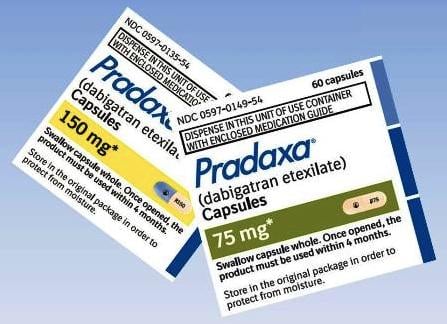
June 21, 2021 — The U.S. Food and Drug Administration (FDA) approved Boehringer Ingelheim's dabigatran etexilate (Pradaxa) anticoagulant oral pellets as the first oral anticoagulant to treat children 3 months to less than 12 years old with venous thromboembolism directly after they have been treated with a blood thinner given by injection for at least five days. The FDA also approved Pradaxa oral pellets to prevent recurrent clots among patients 3 months to less than 12 years old who completed treatment for their first venous thromboembolism (VTE).
Pradaxa received the FDA priority review designation for this indication. Under the priority review designation, the FDA reviews the application within 6 months because it is considered a significant improvement in the safety or effectiveness of the treatment.
In addition, Pradaxa was approved in capsule form to treat blood clots in patients 8 years and older with venous thromboembolism directly after they have been treated with a blood thinner given by injection for at least five days, and to prevent recurrent clots in patients 8 years and older who completed treatment for their first VTE.
Pradaxa is the first FDA-approved blood thinning medication that children can take by mouth; the only other approved blood thinning medication for children is given by injection. Pradaxa was originally approved in 2010 to reduce the risk of stroke and systemic embolism in adult patients with non-valvular atrial fibrillation.
“The FDA is committed to helping our youngest patients with serious medical conditions have treatments that are relatively easy to take,” said Ann Farrell, M.D., director of the Division of Non-Malignant Hematology in the FDA’s Center for Drug Evaluation and Research. “With today’s approval of Pradaxa, pediatric patients have another therapeutic option to treat and prevent potentially deadly blood clots.”
Blood clots can be a serious problem in children as well as adults. Children are most at risk for blood clots if they have cancer, congenital heart disease, a central venous catheter, or are admitted to an intensive care unit. Venous thromboembolism can lead to complications, including swelling and discomfort near the clot, chest pain, lung damage, and even death.
The safety and efficacy of Pradaxa for treating blood clots in patients younger than 18 was evaluated in one study of 267 pediatric patients. In this open-label study, patients were randomly assigned to receive either Pradaxa or standard of care. The study compared the two groups for the number of patients who met the composite endpoint (a combination of multiple clinical endpoints), which meant that they had not died from a blood clot, their blood clots had completely resolved, and they had no additional blood clots. Results showed that 81 (45.8%) of the 177 people taking Pradaxa met the composite endpoint compared to 38 (42.2%) of the 90 patients who received standard of care.
The safety of Pradaxa to prevent recurrent blood clots in the same pediatric population was evaluated in an open-label, single-arm study in 214 patients with a history of blood clots. The primary endpoints of the study were recurrence of blood clots, major and minor bleeding events, and death (both overall and related to blood clots). The safety of Pradaxa with long-term use was similar to the previously discussed study. Recurrence of blood clots occurred in three patients (1.4%), which was comparable to prior standard-of-care treatments.
The most common side effects of Pradaxa include digestive system symptoms and bleeding. Pradaxa can cause serious and fatal bleeding. Pradaxa is not recommended for patients with bioprosthetic heart valves or triple-positive antiphospholipid syndrome. Pradaxa has a boxed warning cautioning that early treatment discontinuation may increase the risk of blood clots and that blood accumulation within parts of the spinal cord (spinal or epidural hematomas) in patients undergoing spinal procedures may cause serious side effects.
Related Pradaxa Anticoagulant Content:
Pradaxa Shows Low Bleeding, Stroke Rates in GLORIA-AF Registry
Advantages and Disadvantages of Novel Oral Anticoagulants
FDA Approves First Reversal Agent for Pradaxa
Real-World Analysis Reinforces Safety, Effectiveness of Dabigatran in Routine Clinical Care


 August 28, 2023
August 28, 2023 









